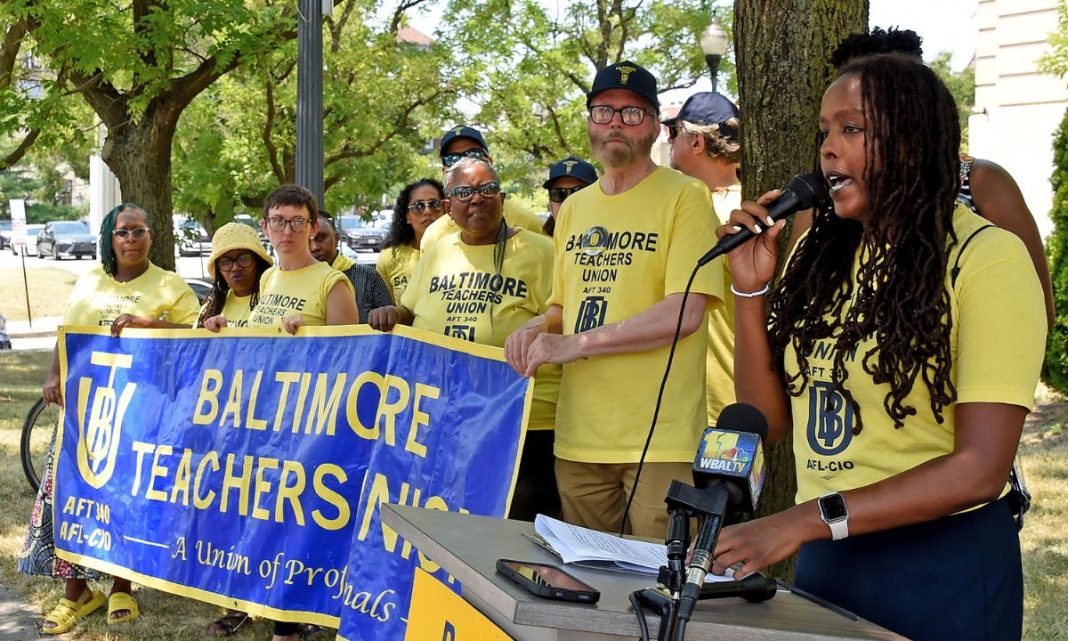Several major school districts have approved teachers union contracts only to find they didn’t have the money to pay for them.
In late August, Philadelphia Public Schools and its teachers union narrowly avoided a strike with an agreement that included 3% annual raises. But weeks later, the district had to seek permission to borrow up to $1.5 billion to help cover the cost of the contract and other expenses.
Districts in Fairfax County, Virginia, and Baltimore County had to renegotiate teacher contracts this summer after budget shortfalls left them without enough funding for promised raises. And Chicago Public Schools approved raises in a four-year union contract in April while staring down a $734 million deficit, before closing the gap as the school year began.
Get stories like this delivered straight to your inbox. Sign up for The 74 Newsletter
Debt has grown steadily for U.S. public schools, from $415 billion in 2013 to more than $586 billion in 2023, according to the latest census data available. Philadelphia and Chicago were among the nation’s top 10 districts reporting debts exceeding revenues in 2023.
Big-City Districts Are Beset by Financial Dysfunction — and Kids Pay the Price
In March, the Philadelphia district adopted a $4.6 billion budget that reflects a growing annual deficit slated to reach $466 million in 2027 and $774 million in 2030. Its three-year contract with the Philadelphia Federation of Teachers, which represents 14,000 educators, counselors and paraprofessionals, depended on an increase in school funding from the state. But more than two months after the deadline for passing a budget, state lawmakers are at an impasse, delaying funding to pay for the contract and other operating expenses. Michael Herbstman, Philadelphia’s chief financial officer, said the $1.5 billion in borrowing will help the cash flow problem.
“The one caveat on that is this does cost us a significant amount,” he said. “The state budget impasse is adding about $15 million to what we will incur in interest costs to borrow — that’s where it hits our budget.”
Experts say declining enrollment, coupled with the expiration of federal pandemic relief funds, have taken a toll on school budgets across the nation. The Philadelphia school district lost more than 15,000 students from the 2014-15 school year to 2024-25.
Chicago Public Schools is in the same boat. The third-largest school district had more than 430,000 students in 2000. This year’s reported enrollment sits at 316,224. The district’s budget approval was delayed this year by efforts to close the $734 million deficit, which included a $175 million payment the city expects for a pension fund reimbursement. For months, district officials and school board members debated whether to address the gap by paying the city or taking out a short-term loan.
$1.5 Billion Chicago Teachers Union Contract Headed to Member Vote
During that time, the district considered delaying raises included in a $1.5 billion Chicago Teachers Union contract that was approved in April — until union President Stacy Davis Gates threatened legal action.
“Contracts are not optional documents,” Davis Gates wrote in a letter to the school board. “They are covenants that provide security to the district’s employees, promises to the district’s students and labor peace for the city as a whole.”
Chicago Public Schools approved a $10.25 billion budget in August that included a swath of cuts and other refinancing to close the budget gap. The district decided against a short-term loan and will move forward with the pension reimbursement only if it receives extra revenue.
The district told The 74 that it balanced the budget to ensure it could “fully meet its obligations related to wages, staffing and programming, as outlined in its labor agreements.”
Chicago Mayor’s Terrible, Horrible, No Good, Very Bad Debt Plan for the District
In Baltimore County, the school district had to go back to the bargaining table with its teachers union this summer after it ran out of money for raises.
In 2023, the district had approved annual pay boosts for 9,000 members of the Teachers Association of Baltimore County without a clear plan to fund them, according to reporting from The Baltimore Banner. Educators received a 3% raise the first year, but when federal COVID relief funds decreased and the county denied the district’s request for more money, officials rescinded the 5% bump that had been scheduled for July 1.
In May, teachers rallied before and after school, demanding “promises made should be promises kept.” The district offered a 1.5% raise but the union rejected it, leading to an impasse before the two parties settled in July on 3.05%. Part of the increase took effect in September, while the rest will start in January.
“We know the impact of high-quality educators on student success,” the union said in a June 6 statement. “When we fight for what we’ve been promised, we do so to keep our veteran educators, to keep our early and mid-career educators, and to continue to compete for new educators to come here.”
In Virginia, Fairfax County Public Schools requested a $248 million increase from its board of supervisors in January to cover raises that were promised in a union contract, but it received less than half of the amount.
The Fairfax Education Unions’ collective bargaining agreement approved in January was its first in nearly 50 years. It included a 7% pay bump for its 27,500 members starting July 1. The county budget shortfall prompted the district to reduce raises to 6% for this school year. Future pay increases will be subject to local government funding.
“The board of supervisors’ refusal to address existing issues and triangulating political interests enables persistent underfunding of [Fairfax County],” the union said in a statement. “[The board] ignored our input and decided teachers, bus drivers, custodians and educational staff deserve remarkably lower compensation than all other public employees.”
The Philadelphia Federation of Teachers declined to comment for this story. Unions in Chicago, Fairfax County and Baltimore County did not respond to multiple requests for comment.

